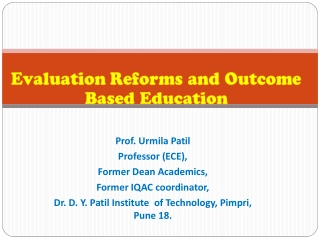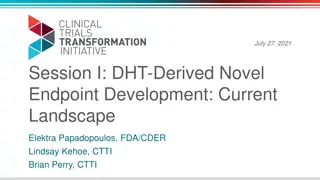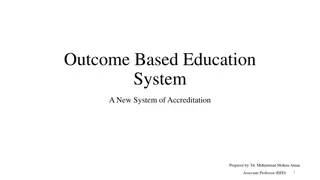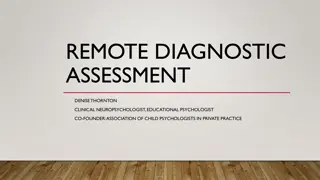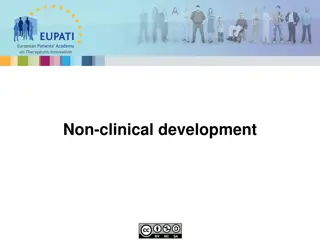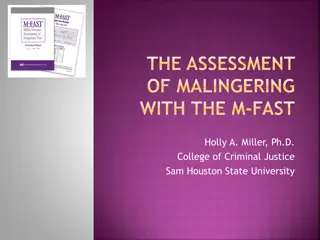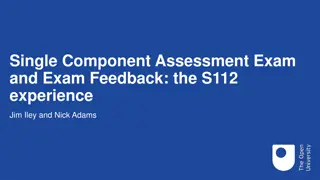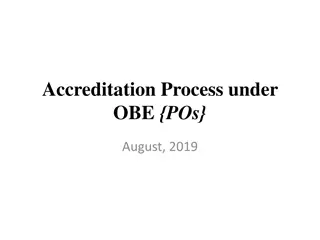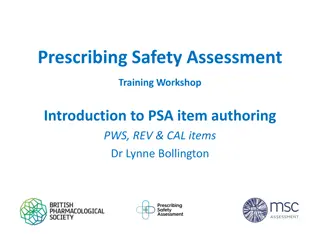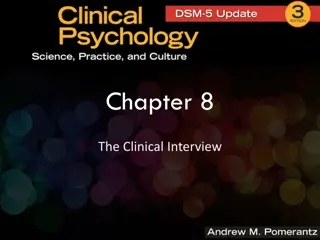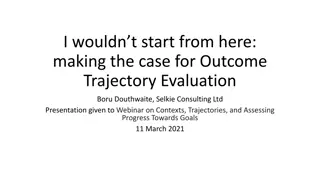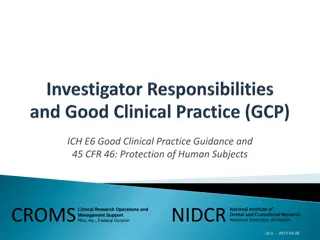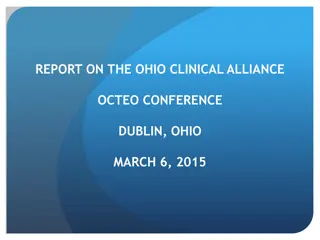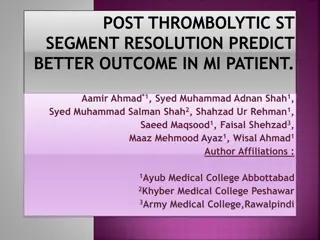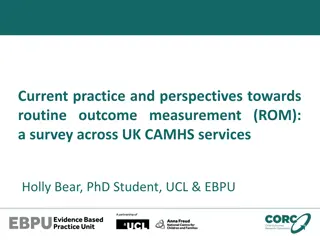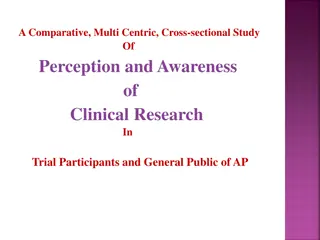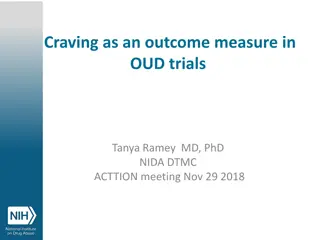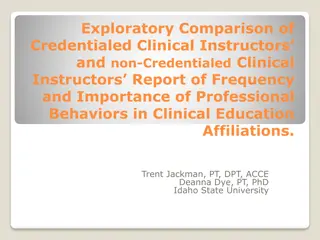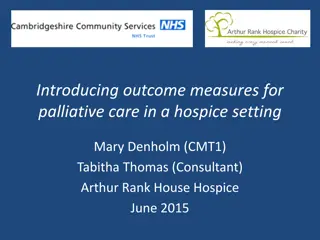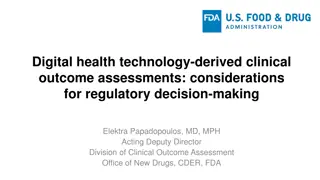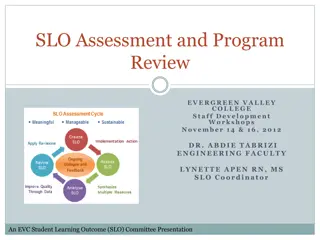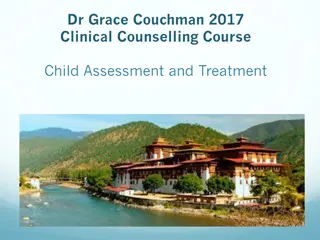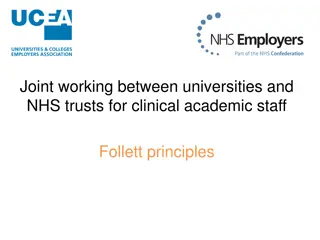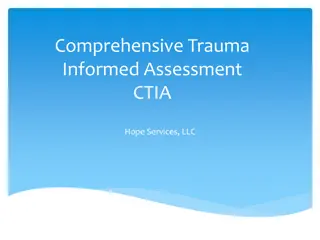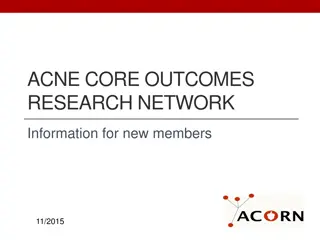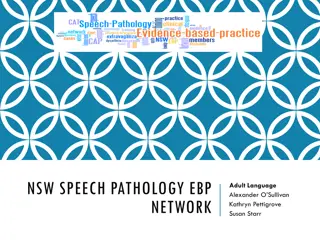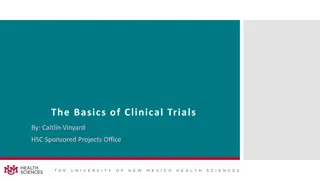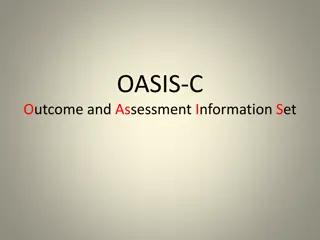Student-Centric Outcome-Based Education
Explore Outcome-Based Education (OBE) by Prof. Urmila Patil, focusing on student-centric teaching and learning methodology with clear objectives and outcomes. Discover how OBE enhances curriculum delivery and assessment.
1 views • 30 slides
Intro to Outcome Measurement in Clinical Practice & Research
Learn key terminologies, assessment, examination, evaluation, and measurement in clinical practice. Understand patient management models for optimal outcomes in physical therapy. Explore data collection and interpretation methods for clinical decision making.
0 views • 20 slides
Understanding Outcome-Based Education (OBE) and Quality Improvement Framework
Outcome-Based Education (OBE) focuses on what students should achieve, captured in Program Outcomes (POs) and Course Outcomes (COs). The process involves curriculum design, teaching methods, assessment of attainment, and continuous quality improvement. Quality in education is defined by clearly stat
5 views • 115 slides
India Alliance Clinical & Public Health fellowship in India
India Alliance Clinical & Public Health fellowship in India\n\nIndia Alliance Clinical and Public Health Research Fellowships are for Health researchers with an MD, MS, MPH, or an equivalent clinical or public health degree, who can apply for the DBT\/Wellcome Trust India Alliance Clinical and Publi
0 views • 5 slides
Overview of DSW End Point Assessment Team Leader Level 3
DSW End Point Assessment Team Leader Level 3 provides a clear understanding of the assessment process, ensuring individuals comprehend why and when it occurs, responsibilities involved, and how DSW supports them. It covers topics such as what End Point Assessment entails, assessment design and deliv
1 views • 18 slides
Ethical Issues in Clinical Pharmacy Research by Dr. Haider Raheem Mohammad
Research ethics play a crucial role in clinical trials and therapeutic research in the field of pharmacy. From discovery to validation, all medicines undergo rigorous evaluation processes to ensure safety, efficacy, and freedom from adverse effects. Clinical trials in both animals and humans are ess
0 views • 20 slides
Advanced Clinical Practice Framework and Pillars of Practice
The document discusses the advanced clinical practice framework and the four pillars of practice which include leadership & management, clinical practice, education, and research. It emphasizes the importance of core capabilities and area-specific competence in advanced clinical practice. The role o
2 views • 8 slides
Digital Health Technology-Derived Clinical Outcome Assessments in Regulatory Decision-Making
This session discusses the landscape of DHT-derived novel endpoints in clinical research, focusing on considerations for regulatory decision-making. It explains the use of digital health technology in clinical outcome assessments and highlights the potential benefits of digitally collected COAs, suc
0 views • 42 slides
Objective Structured Clinical Examination (OSCE): A Modern Approach to Assessing Clinical Competence
The Objective Structured Clinical Examination (OSCE) is a modern examination method widely used in the field of health science to evaluate clinical skill performance. It involves stations where medical students interact with simulated patients to demonstrate competencies such as history taking, phys
1 views • 40 slides
NIMH Clinical Research Education and Monitoring Program Overview
NIMH's Clinical Monitoring and Clinical Research Education, Support, and Training Program (CREST) aims to ensure the proper conduct, recording, and reporting of clinical trials. This program includes clinical monitoring plans, guidelines for site monitoring activities, and independent clinical monit
1 views • 29 slides
Outcome-Based Education System and Bloom's Taxonomy in Engineering Education
Dr. Muhammad Mohsin Aman discusses a new system of accreditation focusing on Outcome-Based Education (OBE) in engineering education. The presentation covers Bloom's Taxonomy, OBE accreditation advantages, Washington Accord, engineering attributes, PEC and NED roles, educational objectives, learning
1 views • 61 slides
Remote Diagnostic Assessment Explained by Clinical Neuropsychologist
Remote diagnostic assessment, also known as telepractice, allows assessors and individuals to be in separate locations while using internet-connected devices for assessment sessions. A facilitator may be present for support, and precautions are taken to ensure confidentiality and integrity of the as
3 views • 13 slides
Understanding Non-Clinical Development in Therapeutic Innovation
The European Patients Academy on Therapeutic Innovation focuses on the non-clinical development phase of medicine, delving into efficacy assessment, safety evaluation, and manufacturing process considerations. Non-clinical studies are essential for decision-making in clinical trials, marketing appli
1 views • 26 slides
Understanding Malingering: Assessment and Implications
Malingering, intentional fabrication of symptoms for external gain, presents challenges in assessment. The M-FAST (Miller Forensic Assessment of Symptoms Test) offers a detailed approach for identifying malingering behaviors. Research suggests relying solely on clinical judgment may lead to inaccura
5 views • 24 slides
Analysis of Single Component Assessment Exam Feedback for S112 Module
The assessment strategy for the S112 module involves a single exam component alongside several TMAs. Findings show little gaming of the system, with most students submitting assignments. Exam performance correlates with the number of assignments submitted. The outcome of the module seems to be affec
1 views • 27 slides
Understanding Evidence-Based Medicine and Clinical Decision-Making
European Patients Academy on Therapeutic Innovation emphasizes the importance of Evidence-Based Medicine (EBM) in providing optimum clinical care. EBM involves systematic review and utilization of clinical research for informed decision-making, benefiting patients in disease management and treatment
7 views • 20 slides
Understanding Outcome-Based Education (OBE) in Accreditation Processes
Outcome-Based Education (OBE) is a crucial aspect in accreditation processes, focusing on defining learning outcomes and aligning curriculum, instruction, and assessment to ensure students achieve essential skills. OBE is not just for accreditation but also about enhancing the quality of education.
0 views • 110 slides
Prescribing Safety Assessment - Item Development Process Overview
In the Prescribing Safety Assessment Workshop, item authoring is a crucial process involving multiple stages such as new item creation, editing, peer review, and final assessment board approval. Copy editors and clinical reviewers ensure the accuracy and quality of item content, while peer reviewers
0 views • 32 slides
Essential Aspects of the Clinical Interview in Psychology
Clinical interviews play a crucial role in the assessment conducted by clinical psychologists, showcasing essential qualities like validity, reliability, and clinical utility. Understanding the importance of feedback and honing general and specific skills as an interviewer are key components in cond
1 views • 17 slides
Understanding Higher Education Assessment: The Complete Guide
Higher education assessment involves a systematic process of collecting, reviewing, and utilizing information to improve student learning and development. This guide covers the assessment cycle, learning outcomes, the mission behind assessment in higher education, what assessment is and is not, reas
1 views • 36 slides
Rethinking Program Evaluation: Embracing Outcome Trajectories
Program evaluators are encouraged to shift focus from the traditional program theory of change to exploring outcome trajectories, which consider the broader context and interlinked changes over time. This approach offers a more insightful understanding of program outcomes and their evolution. An exa
0 views • 18 slides
Clinical Research Guidelines and Regulations Overview
Clinical research encompasses various guidelines and regulations to ensure the protection of human subjects and the credibility of study results. Key aspects include Good Clinical Practice (GCP) standards, Title 45 of the Code of Federal Regulations (CFR) Part 46, and additional CFR sections for cli
0 views • 46 slides
Ohio Clinical Alliance: Transforming Clinical Experiences
The Ohio Clinical Alliance, through collaborative partnerships, aims to enhance clinical preparation for educators. The leadership team comprises various representatives and organizations committed to improving student learning. Their activities include retreats and meetings to ensure effective comm
0 views • 27 slides
Thrombolytic ST Segment Resolution Predicts Better Outcome in MI Patients
Acute myocardial infarction (AMI), commonly known as a heart attack, occurs when blood flow to a part of the heart is blocked, leading to heart muscle injury. Resolution of ST segment elevation on electrocardiogram after thrombolytic therapy can predict final infarct size, left ventricular function,
0 views • 24 slides
Overview of Environmental Impact Assessment and Strategic Environmental Assessment Directives
Environmental Impact Assessment (EIA) and Strategic Environmental Assessment (SEA) play crucial roles in evaluating the impact of planned activities on the environment. This content delves into the concept, origins, development, and key elements of environmental assessment, discussing the legal fram
2 views • 35 slides
Institutional Assessment and Effectiveness Workshop Achievements at SUNY Oneonta
The Office of Institutional Assessment and Effectiveness at SUNY Oneonta has made significant progress in developing assessment protocols and processes, leading to a culture of assessment. This includes completing planning and assessment cycles, establishing objectives and procedures, and aligning u
1 views • 16 slides
Survey on Routine Outcome Measurement in UK CAMHS Services
This study by Holly Bear, a PhD student at UCL & EBPU, explores the current practices and perspectives towards routine outcome measurement (ROM) in UK Child and Adolescent Mental Health Services (CAMHS). The research delves into the barriers and facilitators to utilizing outcome measurement in pract
0 views • 18 slides
Perception and Awareness of Clinical Research in Trial Participants and the Public of Andhra Pradesh
This study focuses on understanding the perception and awareness of clinical research among trial participants and the general public in Andhra Pradesh. It highlights the importance of creating awareness about clinical research, previous study results, public attitudes towards clinical trials, and e
0 views • 24 slides
Understanding Craving as an Outcome Measure in OUD Trials
Craving plays a vital role in substance use disorder (SUD) diagnosis, with intense desires or urges triggered by environmental cues. The focus is on identifying and validating the best craving measure for OUD clinical trials. Near-term goals include qualifying craving as a Clinical Outcome Assessmen
0 views • 12 slides
Comparison of Professional Behaviors in Clinical Education
Professional behavior characteristics play a crucial role in enhancing student learning during clinical education. This study examines the differences in reported importance and frequency of professional behaviors between credentialed and non-credentialed clinical instructors. The background outline
0 views • 28 slides
Outcome Measures in Palliative Care: Introducing IPOS Questionnaire
Outcome measures in palliative care play a crucial role in ensuring quality of life for patients. This study introduces the Integrated Palliative Care Outcome Scale (IPOS) questionnaire as a tool to assess patient well-being, symptoms, and concerns. The primary objectives include implementing and au
0 views • 15 slides
Understanding Digital Health Technology-Derived Clinical Outcome Assessments
This presentation delves into digital health technology-derived clinical outcome assessments (COAs) and their significance in regulatory decision-making. Exploring the definition of digital health technology (DHT), the focus on digitally collected COAs, examples from consortium workshops, and potent
0 views • 12 slides
Evergreen Valley College Staff Development Workshop on SLO Assessment and Program Review
This workshop conducted at Evergreen Valley College focused on integrating Student Learning Outcome (SLO) assessment with program review processes to identify and implement program improvements. Participants learned how to utilize assessment data to modify instruction, integrate SLO assessment into
0 views • 12 slides
Clinical Counselling and Treatment of Child Disorders: Assessment and Interventions
The Clinical Counselling Course by Dr. Grace Couchman in 2017 focuses on child assessment and treatment, covering various disorders such as depression, anxiety, behavior disorders, learning difficulties, autism spectrum disorders, and more. The course emphasizes tools for clinical assessment and cou
0 views • 14 slides
Enhancing Clinical Academic Collaboration Between Universities and NHS Trusts
Clinical academics play a crucial role in integrating clinical practice, research, and education within the NHS. Collaboration between universities and NHS trusts is key to ensure clinical academics address the right questions for patient care and societal benefit. Challenges include an aging clinic
0 views • 29 slides
Understanding Comprehensive Trauma-Informed Assessment (CTIA) at Hope Services, LLC
Comprehensive Trauma-Informed Assessment (CTIA) at Hope Services, LLC aims to collect information on emotional, behavioral symptoms, trauma history, and mental status to provide appropriate diagnoses, treatment, and recommendations. Through clinician training and involvement of DSS/CPS, clients rece
0 views • 12 slides
ACORN Core Outcomes Research Network Overview
ACORN (ACNE CORE OUTCOMES RESEARCH NETWORK) was established in July 2013 with the aim of creating a standardized set of core outcome measures for use in acne clinical trials. Led by key individuals such as Diane Thiboutot, Jerry Tan, and Alison Layton, ACORN focuses on global representation, stakeho
0 views • 10 slides
Evidence-Based Practices in Discourse Treatments for Aphasia
This research review explores the effectiveness of discourse treatments for aphasia, focusing on improvements in discourse that lead to better outcomes for individuals with aphasia. Various treatment techniques and outcome measures are discussed, highlighting the potential benefits of specific inter
0 views • 14 slides
Understanding Clinical Trials: Phases, Types, and Definitions
Clinical trials play a crucial role in advancing medical research and treatment options. This comprehensive guide covers the basics of clinical trials, including their definition, phases, types, and key definitions like IND, IDE, NDA, and more. Discover how different phases of trials work, the vario
0 views • 16 slides
Understanding OASIS-C: A Comprehensive Guide to Outcome and Assessment Information Set
Outcome and Assessment Information Set (OASIS) is a standardized data collection tool for home health agencies to measure patient outcomes and quality of care. Developed over two decades, OASIS is crucial for Medicare and Medicaid providers to assess and improve care for adult patients. The comprehe
0 views • 45 slides
